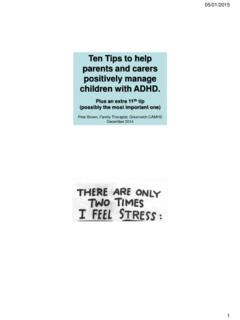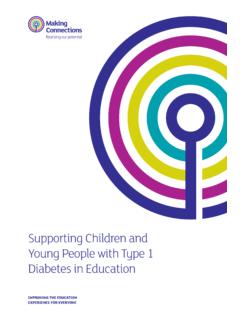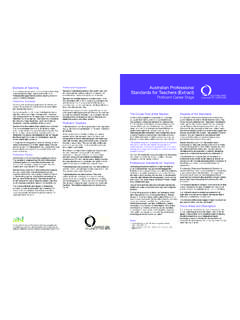Transcription of Charter for Children's Play
1 Charter for children s play We play boulders that s where you sit on the swing and someone shouts boulders , they jump on that person then everyone jumps on top until the last one falls off, unless it hurts, then we stop! IntroductionThe Charter for children s play sets out a vision for play and aims to be a catalyst for individuals and organisations to examine, review and improve their provision for children and young people s play and informal recreation. The Charter may also serve as a guide and framework to all those involved in developing, revising and implementing play strategies, community plans and children and young people s whose services impact on children s play , such as local authorities, voluntary organisations, and health, education and social service providers, can formally adopt the Charter in order to raise awareness of the importance of play .
2 The Charter underpins all play England s work and its adoption is a requirement for value of playPlaying is integral to children s enjoyment of their lives, their health and their development. children and young people disabled and non-disabled whatever their age, culture, ethnicity or social and economic background, need and want to play , indoors and out, in whatever way they can. Through playing, children are creating their own culture, developing their abilities, exploring their creativity and learning about themselves, other people and the world around need and want to stretch and challenge themselves when they play . play provision and play space that is stimulating and exciting allows children to encounter and learn about risk.
3 This helps them to build confidence, learn skills and develop resilience at their own pace. play is the fundamental way that children enjoy their childhood. It is essential to their quality of life as children . Playing is fun: it is how children enjoy themselves. play promotes children s development, learning, imagination, creativity and independence. play can help to keep children healthy and active. play allows children to experience and encounter boundaries, learning to assess and manage risk in their lives; both physical and social. play helps children to understand the people and places in their lives, learn about their environment and develop their sense of community.
4 play allows children to find out about themselves, their abilities, their interests and the contribution they can make. play can be therapeutic. It helps children to deal with difficult or painful circumstances such as emotional stress or medical treatment. play can be a way of building and maintaining important relationships with f riends, carers and family Convention on the Rights of the Child: Article 31 1. States Parties recognise the right of the child to rest and leisure, to engage in play and recreational activities appropriate to the age of the child and to participate f reely in cultural life and the arts. 2. States Parties shall respect and promote the right of the child to participate fully in cultural and artistic life a nd shall encourage the provision of appropriate and equal o pportunities for cultural, artistic, recreational and leisure we mean by play play is what children and young people do when they follow their own ideas and interests, in their own way and for their own reasons.
5 (DCMS, 2004) play is a generic term applied to a wide range of activities and behaviours that are satisfying to the child, creative for the child and freely chosen by the child. It has frequently been described as what children and young people do when not being told what to do by adults. As children grow they are more likely to describe these informal recreational activities in ways other than playing . Under the UN Convention, older children s right to their own recreational and cultural lives is as important as younger children s right to play . This Charter applies equally to all ages of the Charter , children are defined as anyone under the age of 18 years. This definition draws on that used in the United Nations Convention on the Rights of the Child and ratified by the United Kingdom in essence of play is that it arises from children s innate need to express themselves, to explore, learn about and make sense of their world.
6 Its benefits for children derive from them making their own choices, following their own instincts. At play , children have a certain freedom and autonomy from adult direction. This freedom to choose, to explore, to associate, to create, to move around, to challenge themselves and others is an important part of their lives now; and vital to their Charter , therefore, is underpinned by some key understandings: play is an essential part of every child s lif e vital to his or her development. It is the w ay that children explore for themselves the world around them; the way that they naturally develop understanding and practise skills. play is essential for healthy physical and emotional growth, for intellectual and educational development, and for acquiring social and behavioural skills.
7 play may or may not involve equipment or have an end product. children play on their own and with others. Their play may be boisterous and energetic or quiet and contemplative, light-hearted or very serious. children s own culture is created and lived through their the charterMaking it Happen, a detailed guide to implementing the Charter for children s play is available from play England. This guide offers action points to children and young people, parents and carers, play providers, policy makers and planners on different ways to promote the Charter and work towards better provision for play and informal recreation for all children and young s right to playThe right to play and informal recreation, for all children and young people up to 18 years of age, is contained in Article 31 of the UN Convention on the Rights of the Child, ratified by the UK government in 1991.
8 The government has a duty under this convention to protect and promote play opportunities for all children and young people. children have the right to playAll children and young people have the right to play and need to play : free to choose what they do lively or relaxed, noisy or quiet with the chance to stretch and challenge themselves, take risks and enjoy freedom. The right to play is enshrined in Article 31 of the UN Convention on the Rights of the child needs time and space to playAll children and young people disabled and non-disabled whatever their age, culture, ethnicity or social and economic background, need time and space to play freely and confidently with their peers, free of charge, indoors and outdoors, somewhere they feel safe.
9 play provision should actively include the widest range of children and seek to engage with those from minority should let children playParents, carers and other adults can support children and young people s play by respecting the value and importance of all types of play , playing with their children and by creating opportunities and allowing time for children to play independently with their friends, inside and outside the should be able to play freely in their local areasChildren have the same right to use and enjoy public space as others. Local streets, estates, green spaces, parks and town centres should be accessible for children and young people to move around in safety and offer places where they can play freely, experience nature, explore their environment and be with their friends.
10 children value and benefit from staffed play provisionChildren should have access to a choice of staffed facilities where children s play rights and needs are the first priority, such as adventure playgrounds, play centres, holiday play schemes, after-school play clubs, breakfast play clubs, toy libraries, play buses and play ranger s play is enriched by skilled playworkersQualified, skilled playworkers are trained to put children s play needs at the centre of their work in a variety of settings, enhancing the range and quality of play experiences for all children . They are the best people to run staffed play provision for school-aged children . The role of the playworker is as important as that of any skilled professional working with children and should be respected and rewarded need time and space to play at schoolThe school day should allow time for children to relax and play freely with their friends.









